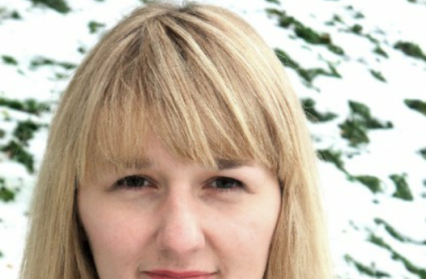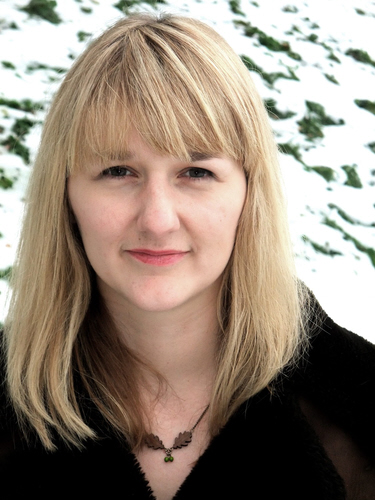Ahead of the release of her latest poetry collection, Ovid’s Heroines, Clare Pollard speaks to Wales Arts Review‘s Carl Griffin about the inspirations and craft.
Tell us about Ovid’s Heroines, out in May, and how the book materialised.
Clare Pollard: I’ve always loved Ovid’s Metamorphoses, but I hadn’t heard of his book Heroides. Matthew Hollis mentioned it one night when we were in a bar in Athens on a poetry tour. And many months later I finally read it and immediately knew it was something special. It’s like Duffy’s The World’s Wife – a series of dramatic monologues spoken by the women of myth such as Phaedra, Medea and Penelope – but written by a man, who also happens to be one of the great love poets of all time, over 2000 years ago!
I couldn’t believe how neglected it was, and I could see there was a real gap for a readable contemporary translation. And although I don’t speak Latin, I’d been doing quite a lot of translation work using literals (from the Hungarian and Somalian), so I set about it in the same way – I kept a couple of existing, scholarly prose translations beside me, along with a Latin dictionary, and began to work through it line by line. It felt like an excavation – blowing the dust of the verse and finding this amazing, living text underneath.
You have said, ‘I believe that poetry is the opposite of propaganda’, but does political poetry still have a place in today’s culture, particularly in the UK, where life is fairly easy. Even if political poetry is needed, isn’t it generally too boring to catch people’s interest, let alone make a difference?
Clare Pollard: Is life fairly easy? For who? Compared to what? I think there are lots of people in the UK right now for whom life doesn’t seem easy at all – people who see no future for themselves. People who are homeless; using foodbanks. Disabled people having their benefits stripped away. Children who can’t concentrate in classes because they haven’t eaten. And the brutal argument of Conservatism, the selfishness it perpetuates, the way it tries to turn poor against poor – the language of strivers and shirkers – is utterly repellent. Yes, I think it’s the job of writers to question this language.
And I have no idea why anyone would think that was boring. Again, compared to what? Another poem about water or the poet’s mum? Surely writing about the world we live in – good and evil, fear and freedom, our relationships with those other than ourselves – is really interesting. I find Akhmatova interesting. I find Milosz interesting. I find Shelley interesting. Whether it can make a difference is a whole other question, but I believe in trying.
Ovid was exiled from Rome due to his writing. You still describe his writing, though, as ‘wonderfully free’. Today we have the freedom of speech Ovid’s Rome did not, but I wouldn’t describe the writing of today, at least in Britain, as ‘wonderfully free’. Do you think we need to be braver?
Clare Pollard: Yes, absolutely. Firstly, there is a lot of self-censorship. Partly on aesthetic grounds – it’s perhaps a product of the rise of Creative Writing classes, but I constantly meet emerging poets who are afraid of using an adverb let alone making an assertion in a poem, in case they find themselves unpublishable. I read an article in Writer’s Forum the other day that told poets to avoid adjectives.
Such nonsensical ‘rules’ deaden poetry – its fine to make students ask themselves whether they use too many adjectives, but obedience to a narrow list of dos and don’ts is quite another thing, and is leading to polite, dull verse. We’re also scared of taking political positions in case we’re accused of ‘preaching’ or bad poetry. And there’s a liberal squeamishness too – the sense that white middle-class writers have no ‘right’ to talk about certain subjects like race or poverty or Islam.
We’ve taken freedom of speech for granted in this country for a long time, but as soon as you start to read poetry from beyond the UK – from places where it is still seen as a political force, such as Palestine or Somalia or China – you realise how precious it is. And I also feel that we’re squandering our freedoms at a time when they are being dangerously eroded. Look at the recent outbreak of arrests for offensive Tweets or Facebook posts. ‘Offence’ is such a subjective, unquantifiable thing – if causing it is deemed to be criminal, then freedom of speech has basically already been lost.
You are well-travelled. Which town or city has stood out for you? How fun is it to explore other cultures in writing, for you personally?
Clare Pollard: Travel is probably my greatest pleasure. I always feel truly alive when I’m travelling – discovering, learning, experiencing new things. And then I love the sun and good food and spending time with my husband. And it always inspires me – I think writers can generally be grouped into hermits or adventurers, those who prefer to travel in their minds and those who go out seeking life to write about. I’m definitely in the latter camp. It’s hard to pick a place that stands out most – I loved Saigon and Jaipur and Mexico City. And then I love Rome, obviously. And New York.
In terms of writing about different cultures, I’m always keen to explore them from my position as an outsider; as a privileged westerner. I never pretend to be anything other than a tourist in my poems, and I think that’s important. You can’t hope to ever fully ‘know’ another culture, but I’m interested in globalisation: the way we all join up; our responsibilities; what we can learn from each other.
On February 21st you are reading at the National Portrait Gallery with Luke Wright and Ross Sutherland. How is it performing with poets who are more performance-focused? Would you like to explore spoken-word poetry in more depth, or does the reading of your poetry come second to the writing of it?
Clare Pollard: I find the whole performance/page divide a bit of a distraction. Of course, there are some performers on the poetry circuit who have got there by force of personality, and whose work doesn’t stand up on the page. And there are a few old-school poets who are dreary readers, and put no effort into creating a relationship with their audience. But the best poetry always works on both page and stage. It’s an art form with oral roots – it’s meant to be spoken and memorised. It’s very important to me that my poems sound good, and I read aloud as I’m writing.
I’m interested in rhythms, and have learnt a lot from those poets dismissed as performance-based – particularly the tumbling rhythms of hip hop or dub. I’m hoping to put a bit of a show together for Ovid’s Heroines, and am learning some of the dramatic monologues by heart. Classic poetry was ‘spoken word.’ Anyone hearing Alice Oswald recite Memorial, her reworking of Homer’s Illiad, would realise how bizarre our arbitrary divisions are.













